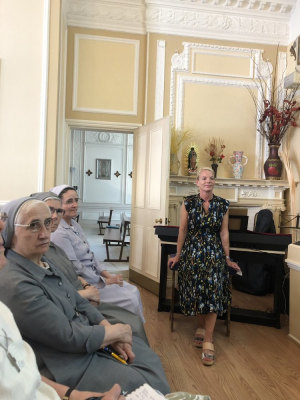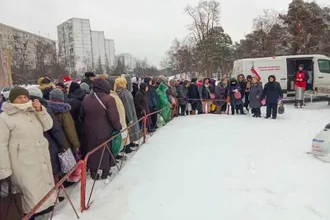"Who wouldn't trust a nun?" asks police expert on human trafficking

DS Helene Miller with Religious of Mary Immaculate Sisters
Source: Conference of Religious
One of the keynote speakers at a large meeting of religious in London to address human trafficking has praised the contribution and support given to the police by churches and by religious congregations. Detective Sergeant (DS) Helene Miller of the Metropolitan Police's Human Trafficking team works closely with the Rahab initiative set up by the Sisters Adoratrices in the Kensington area. The project, which is marking its tenth anniversary, was established to care for women affected by prostitution and human trafficking for sexual exploitation. In these sensitive situations, when victims are maybe distrustful of figures of authority and officials, DS Miller quite simply asked: "who wouldn't trust a nun?"
The meeting was organised by the Conference of Religious to help boost involvement in anti-trafficking efforts. It was attended by around 60 members of congregations.
DS Miller, who gave a joint presentation with Rahab's Community Engagement and Partnerships manager, Bex Keer, cited the example of a raid on premises where a number of victims of human slavery had been rescued. A hall was provided to offer immediate, emergency accommodation. The individuals were housed, fed, clothed and given a safe space in which interpreters could be invited in, to allow interviews with police to be conducted - a vital part of the process that paves the way for prosecutions to be pursued.
Bex Keer described the Rahab project as, "a real collaboration between a religious congregation and statutory authorities, working in the two London boroughs with the largest sex industry" - and gave a broad outline of how the cooperation works. The Rahab team try to gain 'intelligence' on properties where women might be victims of exploitation. When raids then take place, officers do a risk assessment to make sure the women are safe and Rahab staff are there in tandem, to provide back up assistance and immediate support to the women, "with the police asking questions that we wouldn't ask".
Making the point that the problem of human slavery is "hidden within sight," attendees at the meeting were told that within the five minutes they had spent walking to the venue from the tube station, they had passed several flats from which victims of slavery had been rescued.
DS Miller added: "We cannot combat modern slavery alone, and whilst we work alongside many government agencies, it's the goodwill of the Church and religious organisations whose support we truly value - they do the jobs we can't always do - reaching out into the community, supporting the most vulnerable in society and being our 'eyes and ears'. Perhaps the most valuable asset the Church has is being able to provide facilities for police to use as a 'safe haven' for victims, away from a police station, where we can assess their needs, conduct interviews and provide information and updates."
The meeting also heard presentations from Mick Duthie of the Santa Marta Group, a representative from the Medaille Trust and a Croydon based anti-trafficking group, as well as individual Religious who work on the frontline with victims. Sr Patricia Mulhall CSB, who accompanies people who have to spend hours at the Home Office, as they seek leave to remain, spoke of the misery experienced by victims of trafficking. Brother Malachy Brannigan OH, who runs Olallo House, a central London safe house for victims of human slavery, described how he had become wise to the deviousness of traffickers and no one gets into the property without being questioned by him (including interpreters). Sr Bridgetta Rooney CSJP described how fruitful it had been for her congregation to lease a property to the police so that victims had a sanctuary in which to be interviewed about their ordeal. Sr Bridgetta noted that in the East Midlands the police would appreciate further properties being made available for this purpose. Sr Mary Agnes Idiong IBVM, who works with the Medaille Trust, spoke about befriending 'Agatha' who was trafficked into the UK and whilst now liberated, is completely alone.
The initiative follows a large research project last year by the Arise Foundation which revealed the under-reported but massive scale of involvement by Religious in anti-trafficking. A booklet was produced to coincide with the meeting with information for Religious about ways to get involved. For a copy email: admin@corew.org
The Conference of Religious has been asked by the police if congregations in certain areas of England would be able to offer support with anti-trafficking, eg. to provide properties for interviews as outlined above. For details, email: communcations@corew.org


















